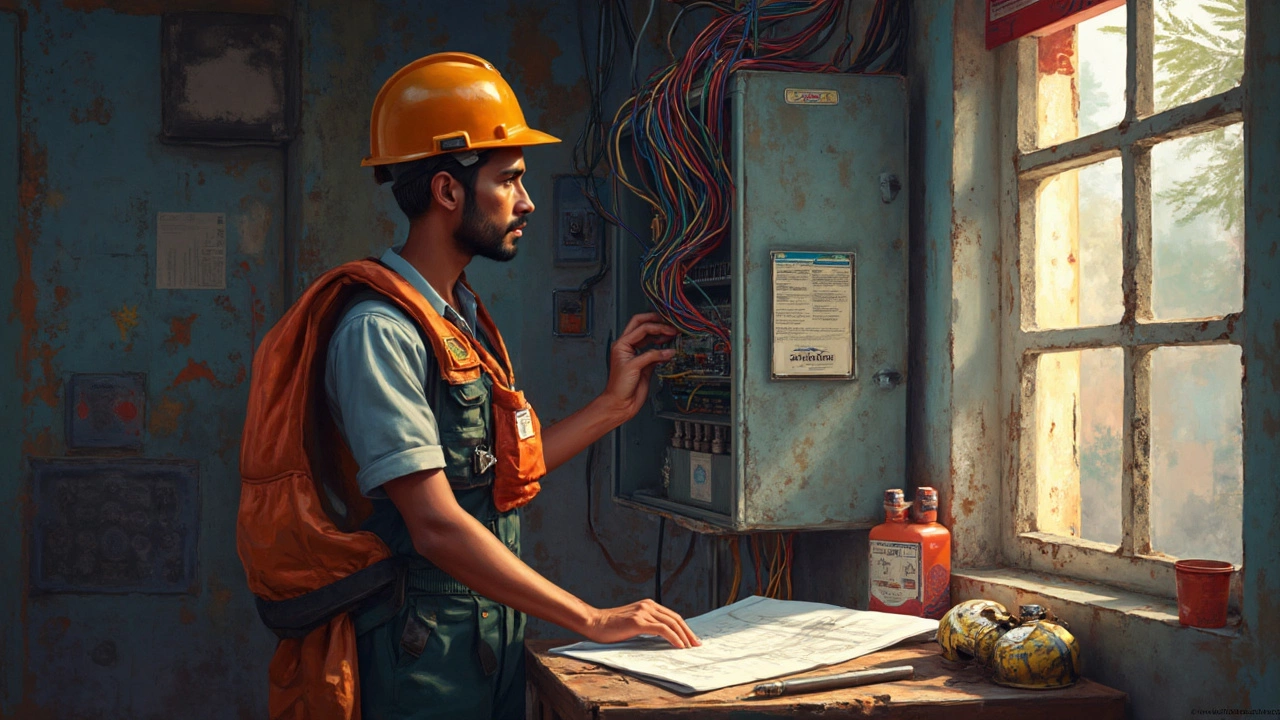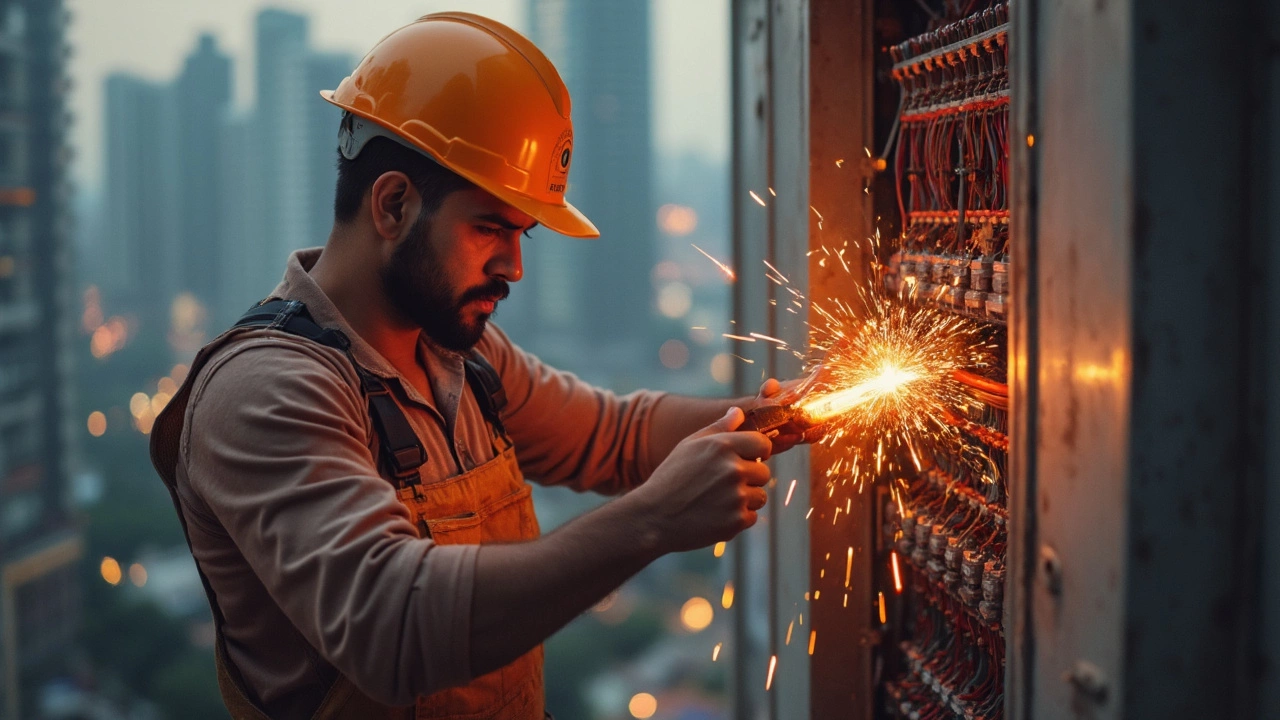Have you ever wondered what it takes to become a successful electrician? It's not all about tangling with wires or climbing up poles. The job requires a blend of technical skills, problem-solving abilities, and much more. If you're thinking about pursuing this electrifying career path, you'll need to equip yourself with a range of skills.
First up, let's chat about technical skills and knowledge. An electrician needs to understand blueprints, technical diagrams, and specifications. Being comfortable with these documents is key, as they guide most of the work. You might need to install wiring or maintain electrical systems, and these skills are your map to get the job done right.
But wait, there's more! Problem-solving is another huge part of the job. Imagine trying to figure out why a circuit keeps tripping. That's where your detective skills come into play—analyzing the situation and finding a solution is a big part of daily life as an electrician.
- Technical Skills and Knowledge
- Problem-Solving Abilities
- Communication and Interpersonal Skills
- Safety Awareness and Practices
Technical Skills and Knowledge
Getting the hang of the technical aspects is like learning the ABCs of being an electrician. You need to be spot-on with your electrician skills because this is what separates the pros from the amateurs.
Understanding Blueprints and Diagrams
Blueprints, schematics, and diagrams are your best friends on the job. These documents lay out the roadmap for all things electrical in a project. If you’re not comfortable reading these, you might feel like you’re trying to read a foreign language. So, it’s crucial to get comfortable with these blueprints early in your training.
Wiring and Electrical Systems
Learning how to install and maintain wiring and electrical systems is where the real fun begins. This is the bread and butter of an electrician’s job. Knowing the ins and outs of different electrical systems helps you tackle various tasks, whether it’s residential, commercial, or industrial projects.
- Residential Wiring: This involves understanding how to set up electrical systems in homes, which can range from lighting to complex home automation systems.
- Commercial and Industrial Systems: These require a more extensive knowledge base. You might find yourself working on larger-scale power systems, requiring more robust planning and problem-solving abilities.
Tools of the Trade
You can't talk about electrician training without mentioning the tools. From wire strippers and pliers to sophisticated testing equipment, knowing how to use your tools efficiently is crucial. Plus, being adept with tech tools can help diagnose problems faster and more accurately.
Safety Protocols
Electrical work isn’t just about connecting the dots. There’s a real element of risk, so understanding safety protocols is non-negotiable. Proper training ensures you know how to handle emergencies and maintain safe working conditions.
Here’s a nifty little fact: According to a survey conducted last year, over 80% of electrical accidents happen due to a lack of understanding of these essential skills. That just goes to show the importance of having your skillset locked down!
Problem-Solving Abilities
Being an electrician isn't just about handling wires. A big chunk of the job involves using your brain to figure things out when they don't work as expected. You know, when a connection is off, or a system stops working, that's when problem-solving abilities step in.
One might think, what kind of problems are we talking about? Well, electricians often deal with issues like broken circuits or faulty wiring. Imagine the lights go out in a whole block; figuring out the reason behind it and fixing it is pretty much like a real-life puzzle. And who doesn't love a good puzzle, right?
Understanding the Bigger Picture
To solve problems efficiently, an electrician needs to see the bigger picture. It's about understanding how one part of an electrical system fits into the entire setup. This way, you can pinpoint issues without going round in circles.
Good Ol' Hands-On Experience
They say practice makes perfect, and that's true here too. The best electricians often have loads of hands-on experience. It's not just book knowledge, but actual work done on sites that makes a difference. Each problem you solve adds to a treasure chest of experiences, making you better and faster at identifying issues down the line.
Think Like a Detective
When faced with an electrical issue, you have to think like a detective. Gather your evidence, analyze the situation, and test different solutions until you find the right one. For instance, if an appliance isn't working, test the power supply, the connections, and so on. It's a logical process of elimination.
In short, problem-solving isn't just a skill, but more of a mindset for electricians. It involves a mix of knowledge, experience, and creative thinking, all working together to keep the lights on, quite literally!

Communication and Interpersonal Skills
So, you might not think of communication as crucial for an electrician, but it really is! Picture this: you're on a job site, and there's a ton of people, from construction workers to engineers, all trying to accomplish the same project. Knowing how to effectively share information can make or break how smoothly everything runs.
First, let's delve into why communication skills are essential. An electrician often needs to explain technical issues or solutions to people who may not have any technical background. This means breaking down complex electrical problems into simple, understandable terms. It's not just about being understood, but also about listening carefully to the clients’ needs and concerns.
Collaborating with Other Trades
When you're working on-site, you won't be alone. Collaborating with contractors, architects, and other trades is part of the daily grind. Being able to communicate clearly with them ensures that you're all on the same page and working towards the same goals. Clear communication can help avoid costly mistakes and delays.
Strong Interpersonal Skills
Next, think about the interpersonal side of things. Electricians often work in small teams or directly with clients, so being a team player is critical. Having a positive attitude and working well with others not only makes the day more enjoyable but can lead to better job satisfaction and even more work opportunities.
Okay, let's get into some stats for a moment. According to a recent industry survey, electricians who possess strong communication and interpersonal skills report a 20% higher satisfaction rate in their careers. They're also more likely to receive client referrals, which is huge in this business.
Handling Difficult Situations
You might sometimes meet clients who are hard to please or situations that are full of stress. How you handle these can set you apart. Being patient, empathetic, and maintaining your professionalism during challenging times are key traits of a successful electrician.
In short, if you're aiming to shine in the electrical field, don't just focus on the wires and circuits. Work on your communication and interpersonal skills too. They'll help you connect not just to systems, but to the people you work with every day.
Safety Awareness and Practices
When it comes to working as an electrician, staying safe is a top priority. The electrical field is filled with potential hazards, and knowing how to navigate them is crucial.
Understanding Safety Protocols
Every electrician must have a firm grasp on the safety protocols. This isn't just about wearing the right gear, though that's important too. It's about understanding the comprehensive safety standards set by organizations like OSHA (Occupational Safety and Health Administration).
For instance, ensuring the power is off before starting any work is not just a suggestion—it's a strict rule. Quick checks with your multimeter can save you from unnecessary risks.
Protective Gear
Speaking of gear, electricians are often seen sporting a variety of safety equipment. Here's a typical checklist:
- Insulated gloves to prevent electric shock.
- Safety goggles to guard against particles and sparks.
- Non-conductive footwear to reduce risk of ground accidents.
Making these part of your daily uniform isn't just good practice—it's essential for reducing injury on the job.
Regular Training and Refreshers
Even seasoned electricians benefit from brushing up on safety measures. Regular training sessions ensure everyone is up-to-date with the latest in electrician training and safety innovations.
| Year | Electrical Fatalities in the U.S. |
|---|---|
| 2020 | 160 |
| 2021 | 180 |
| 2022 | 200 |
As you can see in the table, despite safety measures, electrical fatalities have seen an increase. Regular training aims to reverse this trend.
Emergency Preparedness
Being prepared for emergencies is the final line of defense. Knowing the quickest way to respond if an accident does occur can make all the difference. Electricians should always be familiar with emergency exits, fire extinguishers' locations, and first aid procedures.
Ultimately, a proactive approach to safety doesn't just protect you—it also ensures a smoother working environment for everyone involved. Now, that's a practice worth following!



